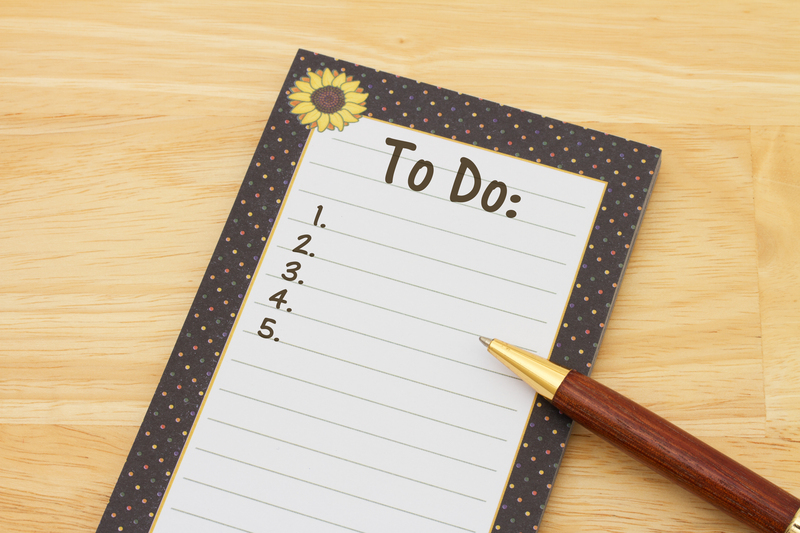Master the Art of Jewellery Cleaning at Home
Posted on 03/09/2025
Master the Art of Jewellery Cleaning at Home
Jewellery has a special place in our lives, symbolizing precious moments, family heirlooms, and personal achievements. However, over time, even the most cherished pieces can lose their sparkle due to dust, oils, and daily wear. Thankfully, you don't need to visit a professional every time your jewellery looks dull. With the right techniques and materials, you can revitalize your treasures safely at home. In this guide, we'll teach you how to master the art of jewellery cleaning at home, helping you keep your pieces radiant and beautiful.
Why Regular At-Home Jewellery Cleaning Matters
Many people underestimate the importance of routine jewellery cleaning. Daily exposure to lotions, perfumes, sweat, and even the environment can make rings, necklaces, and bracelets lose their lustre. If you want your gems to shine brilliantly and last for generations, keeping them clean is essential.
- Protects Your Investment: Regular cleaning maintains the condition and value of your jewellery.
- Prevents Problems: Cleaning helps you spot loose stones or damaged clasps early.
- Enhances Appearance: A little sparkle goes a long way in making you feel your best.

Understanding the Different Types of Jewellery
Before you start with your jewellery cleaning at home, it's crucial to identify the types of materials you're dealing with. Different metals and stones require different care.
Common Jewellery Materials
- Gold Jewellery: Known for its warmth and shine, but can scratch easily.
- Silver Jewellery: Prone to tarnish but easy to clean with the right products.
- Platinum Pieces: Durable but can develop a patina over time.
- Diamond & Gemstone Jewellery: Hard-wearing but settings can accumulate grime.
- Pearls and Organic Gems: Delicate and sensitive to chemicals.
- Costume Jewellery: Often uses base metals and adhesives, needing gentle care.
Always read care information provided by your jewellery manufacturer before using any cleaning method.
Essential Tools for Cleaning Jewellery at Home
You don't need expensive gadgets or commercial products. In fact, you probably already have most of the tools you need in your kitchen or bathroom. To clean your jewellery at home, assemble the following:
- Soft-bristled toothbrush: Ideal for removing dirt from crevices.
- Mild dish soap or gentle detergent: Safely cleans most metals and gems.
- Microfiber cloths: For drying and polishing without scratching.
- Bowl of warm water: Critical for soaking and rinsing.
- Cotton swabs: To clean intricate details and delicate settings.
- Jewellery polishing cloth: For the final buff.
Optional: Commercial silver dips, ultrasonic cleaners (for certain jewellery only), and baking soda for stubborn tarnish.
Step-by-Step Guide to At-Home Jewellery Cleaning
1. Inspect Your Jewellery
Before cleaning, inspect your jewellery carefully. Check for loose stones, weak clasps, or signs of damage. If you find any issues, avoid cleaning at home and bring the piece to a professional jeweller for repair.
2. Prepare the Cleaning Solution
For most metals and stones, a mixture of warm water and a few drops of mild dish soap is effective. Avoid using harsh chemicals, bleach, or abrasive cleaners.
- Fill a small bowl with warm (not hot) water.
- Add a few drops of mild dishwashing liquid.
- Mix gently to create suds.
3. Soak and Gently Clean
Place your jewellery pieces in the solution. Let them soak for 10-20 minutes to loosen dirt and oils.
- Use a soft-bristled toothbrush to gently scrub around gemstones, under prongs, and in crevices.
- Don't apply too much pressure, as this can scratch softer metals or move settings.
- For intricate details, use a cotton swab.
4. Rinse and Dry
- Rinse each piece under lukewarm running water.
- Hold jewellery over a strainer or plug the sink to avoid accidental loss.
- Pat dry with a microfiber or soft lint-free cloth.
Avoid using tissues or paper towels as they may scratch the surface of your jewellery.
Cleaning Specific Types of Jewellery
How to Clean Gold Jewellery at Home
Gold is a soft metal that requires gentle care. Here's a simple method:
- Soak gold pieces in warm, soapy water for 15-20 minutes.
- Brush lightly with a soft toothbrush.
- Rinse thoroughly with clean water.
- Dry and buff with a jewelry or microfiber cloth.
Cleaning Silver Jewellery
Silver tarnishes when exposed to air and moisture. To make silver sparkle again:
- Soak in a solution of 1/2 cup white vinegar and 2 tablespoons baking soda for 2-3 hours.
- Rinse thoroughly and polish with a silver cloth.
- For stubborn tarnish, use a paste of baking soda and water, gently rub, and rinse.
How to Clean Diamond or Gemstone Jewellery
Diamonds may be hard, but they're magnets for grease and dirt. Most colored gemstones can be cleaned like diamonds unless they are porous (e.g., opal, turquoise):
- Soak in warm, soapy water.
- Brush with a soft toothbrush, especially under the stone.
- Rinse under cool water and dry with a soft cloth.
Note: Never use hot water or strong solutions on gemstones, as they may crack or discolor.
Pearl and Delicate Jewellery Cleaning
Pearls and organic gems are very sensitive to chemicals and moisture. Avoid soaking.
- Wipe gently with a damp, soft cloth after wearing.
- If deeper cleaning is needed, use a solution of lukewarm water and gentle soap, dip a cloth in, and dab the pearls. Never submerge them.
- Allow to air dry completely on a soft towel before storing.
Cleaning Costume and Plated Jewellery
Costume pieces and plated jewellery may have glued-in stones or coatings:
- Avoid soaking, as water may weaken adhesives.
- Use a soft, damp cloth to wipe away dirt and fingerprints.
- Dry thoroughly to prevent tarnish and damage.
Jewellery Cleaning Mistakes to Avoid
While it's easy to clean your jewellery at home, certain mistakes can cause lasting damage. Here are key mistakes to avoid:
- Using harsh chemicals or abrasive cleaners: These can erode metals and dull stones.
- Ultrasonic cleaners on delicate pieces: Not suitable for pearls, emeralds, opals, or glued-in stones.
- Soaking too long: Extended soaking can loosen settings and damage soft gems.
- Not inspecting before cleaning: Missing loose stones may lead to loss.
- Mixing metals and stones in solution: They may scratch each other.
Homemade Jewellery Cleaning Solutions That Work
If you prefer natural or homemade alternatives, several safe options work well for cleaning jewellery at home:
Baking Soda Paste (for Silver)
- Mix 2 parts baking soda with 1 part water.
- Apply the paste using a soft cloth, rub gently, and rinse.
Lemon and Salt (for Brass or Copper)
- Cut a lemon in half, dip in salt, and rub gently on the jewellery.
- Rinse and buff dry.
Club Soda Soak (for Gemstones and Diamonds)
- Soak jewellery in club soda for a refreshing sparkle, then rinse and dry.
How Often Should You Clean Jewellery at Home?
- Everyday pieces: Clean every two weeks or as needed.
- Special occasion jewellery: Clean before and after wearing.
- Pearls and delicate items: Wipe after each use and deep clean sparingly.
Remember, routine home cleaning will keep your treasures looking spectacular and minimize upkeep when you visit a professional jeweller.
Professional Tips for Lasting Sparkle
- Store jewellery properly: Use fabric-lined boxes and anti-tarnish strips.
- Remove before swimming or showering: Chemicals and water can damage many materials.
- Get annual checks: Let a professional jeweller check the settings and deep clean as needed.
- Handle with clean hands: Oils and lotions can transfer to your jewellery easily.
Frequently Asked Questions
Can I use toothpaste to clean my jewellery?
No, toothpaste is too abrasive for gold, silver, and soft gemstones, and may scratch or dull the surface.
Is it safe to clean jewellery with vinegar?
Vinegar can work for sterling silver but may harm pearls, plated items, and some gemstones. Be cautious and test on a small area first.
How can I clean my rings at home?
Soak in warm soapy water, gently brush with a soft toothbrush, rinse, and dry.
Does ultrasonic cleaning work for all jewellery?
No, avoid using ultrasonic cleaners for pearls, emeralds, opals, or pieces with glued-in stones.
How do I clean tarnished silver necklaces?
Try a baking soda paste or silver dip. Rinse thoroughly and buff.

Conclusion: Make Jewellery Cleaning at Home a Habit
Mastering the art of jewellery cleaning at home doesn't require expensive supplies or a professional touch -- just attention to detail, patience, and the right techniques. With a gentle hand and the tips shared above, you'll keep your cherished pieces shining brightly for years to come. Incorporate these routines into your regular care, and never shy away from showing off your brilliance!
Remember: When in doubt or dealing with ultra-valuable pieces, consult a professional jeweller for expert advice and advanced cleaning.
Unlock the Brilliance: Let Your Jewellery Shine!
With consistent at-home care, your precious possessions will keep telling your story -- sparkling, stunning, and timeless. Happy cleaning!
Latest Posts
Clever Strategies to Outsmart Cleaning Chores
Ulimate Guide to Erasing Persistent Pet Smells
10 Effective Carpet Hacks to Rid Your Floors of Pesky Dog Hair



